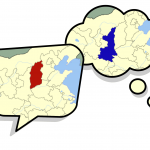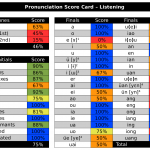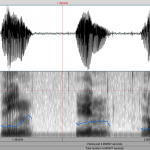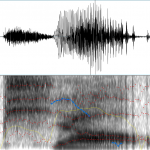Articles tagged with ‘Tones’ Page 3
-
Tone errors in Mandarin that actually can cause misunderstandings
Accidentally saying “chest hair” in Chinese when you mean “panda” is amusing, but it rarely causes confusion. Let’s look at some tone mistakes that actually do cause confusion!
Read → -
Training and testing your ability to hear Mandarin sounds
Learning to hear the sounds in a new language is a very important step, both to understand it and to pronounce it yourself. This article gives you methods and tools for training and testing your ability to hear the sounds of Mandarin.
Read → -
Obligatory and optional tone change rules in Mandarin
As if learning basic tones wasn’t enough, tones in Mandarin also influence each other and change depending on context. Some of these tone change rules you have to learn, but others are better left alone and will be absorbed automatically over time.
Read → -
7 kinds of tone problems and what to do about them
Tones are tricky to learn and students often encounter many different kinds of problems. Since the solution to them are very different, it’s important to understand what the problem actually is before you try to do something about it!
Read → -
Learning tones in Mandarin is not optional
Learning tones in Mandarin is not optional. The longer you wait before paying attention to tones, the more you will have to relearn later. If you don’t know the tone, you don’t know the word. It takes time to learn to hear tones and treat them as integral parts of syllables, but the sooner you start, the better.
Read → -
The Hacking Chinese free tone training course
Learning to hear the difference between tones is difficult for many learners. Research shows that speaker variability and a systematic and predictable approach are key to overcoming the problem. With this article, I launch a tone training course, which is meant to provide you with just that. For free!
Read → -
How to find out how good your Chinese pronunciation really is
Evaluating pronunciation needn’t be hard, but many methods commonly used by teachers are deeply flawed, resulting in inaccurate error analysis. If we want to improve, we need to be clear about what we need to improve first. This article looks at some problems with commonly used methods to evaluate pronunciation and suggests some alternatives.
Read → -
Two reasons why pronunciation matters more than you think
Good pronunciation matters, whether you like it or not. In general, students (and teachers) tend to stop caring about pronunciation much earlier than they should. You don’t need to aim for native-like pronunciation, but clear and easily-understood Chinese should be the goal of all students. In this article I present two arguments: one about the fact that pronunciation and communication are closely linked, one about how pronunciation reflects both you as a person and your other skills.
Read → -
Focusing on tone pairs to improve your Mandarin pronunciation
When learning to pronounce tones in Chinese, it makes sense to focus on words rather than single syllables. Most words in Mandarin are disyllabic and since practising these will also include tone changes (sandhi), focusing on tone pairs is recommended. This article gives you all HSK and TOCFL words, sorted by tone! First all [first tone] + [first tone], then all [first tone] + [second tone] and so on. This is great for students who need words to practise difficult combinations, but it’s also useful for teachers.
Read → -
About fossilisation and improving your Chinese pronunciation
It’s a fact that most foreign adults don’t acquire native like pronunciation in Chinese, but what’s the reason? In most debates at this point, someone will throw in the word “fossilisation”, as if that actually explained anything. This article is about why the concept of fossilisation is bunk and how we should think about adult pronunciation instead.
Read →









